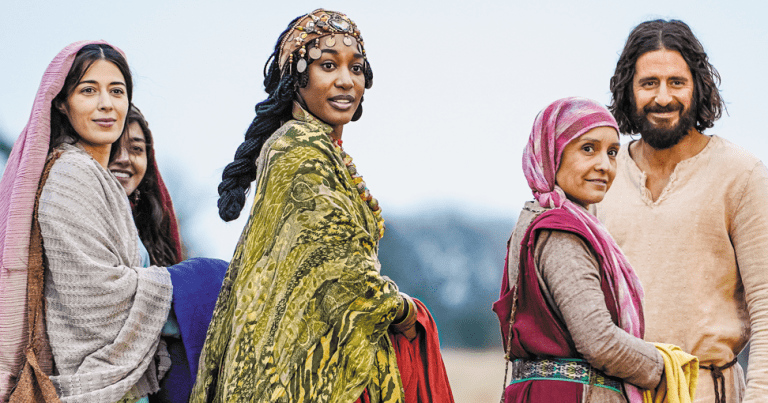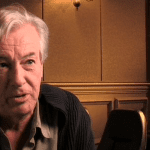In the early days of the Covid-19 pandemic, the producers of The Chosen — a new dramatic series about the life of Jesus — decided to make the entire show free online, for at least a few weeks.
Just a few months earlier, they had finished the first eight-episode season and released it through an app that let viewers watch a few episodes for free, but then required them to contribute to a pay-it-forward program if they wanted to watch more. (Each time someone watched an episode, it began with a note saying which previous viewer had paid to cover the cost of streaming it.)
Now though, with audiences stuck at home and looking for things to do, the show’s creators decided to release all eight episodes to Facebook and YouTube during the week leading up to Palm Sunday, along with cast interviews and short glimpses behind the scenes that gave viewers a look at how and why the series was made.
“We were only going to do it for a few weeks,” says Dallas Jenkins, the Chicago-based filmmaker who directed every episode and co-wrote them with Ryan Swanson and Tyler Thompson. “We just thought it would be a gesture of goodwill. We knew people were starting to discover the show more because they were home and had more time. So they were looking for hope and we thought, ‘Let’s make it easy for them. And we will lose money, because streaming costs money, but that’s okay.’ ”
To the producers’ surprise, contributions to the show went up. “The day we launched on YouTube, our income literally quadrupled,” says Jenkins. “And then the next day it went up even more, so we just decided to make the show free forever.” (Jenkins points to “a couple hundred thousand” downloads of the app in Canada. The Google Play online store reports 5 million downloads worldwide.)
Jenkins cites the experience as another example of what he and his wife Amanda call “God’s impossible math.” The first season was financed through crowdfunding — some 16,000 investors, inspired by a Nativity-themed short film Jenkins released in 2017, contributed $10 million to the first season, more than any previous crowdfunded TV series — and now the show’s success on social media gave Jenkins and his producers confidence they could go ahead with season two and more.
“It changed everything,” says Jenkins. “It became clear we most likely weren’t going to have any trouble doing future seasons.”
×–×–×
THERE HAVE been many movies about Jesus since the first filmed passion plays were produced in the late 19th century, and there have been more than a few limited miniseries, but The Chosen has been billing itself from the beginning as the first multiseason series about Jesus — and with the second season’s production in Texas and Utah last winter, and the premiere of its first episode on Easter Sunday, that self-description has finally come true.
The extra screen time has allowed the series to flesh out the disciples and other characters in some depth. Many of these characters have been virtually ignored in earlier productions, but The Chosen gives them detailed backstories and a range of personalities to show how Jesus related to His followers as individuals, and how the followers related to each other as a community.
For example, one episode pulls together several passages about James and John, the sons of Zebedee, to create a well-rounded portrait of two overly assertive, hotheaded guys who rub their fellow disciples the wrong way (Mark 10:35–45), express contempt for Samaritans (Luke 9:51–56) and earn the nickname “sons of thunder,” which Jesus gives them (Mark 3:17).
Even the fact John’s Gospel calls John “the disciple Jesus loved” is framed, however gently, as an expression of John’s competitive streak. (When John tells Mary, “He loved me,” she smiles and replies, “He loved all of you. You just feel the need to talk about it more often.”)
The series has also paid a great deal of attention to Simon Peter’s relationships with his family, especially his wife, who is anonymous in the Bible but named Eden in the series, and his brother and fellow disciple Andrew.
The Gospels say Jesus healed Peter’s mother-in-law (Mark 1:29–31) — an event that happens in season one — and the epistles say Peter’s wife accompanied him on his journeys (I Corinthians 9:5), but Peter’s wife is almost never included in movies about Jesus. Jenkins says the show’s depiction of Eden, and the scene in which Jesus tells her He appreciates the sacrifice she is making by letting Peter join His ministry, has received a lot of positive feedback from pastors’ wives and others who see themselves in Eden’s story.
And the show’s attention to the female followers of Jesus doesn’t stop there. Mary Magdalene is one of the show’s primary characters — the very first episode begins with a flashback to her childhood — and a recurring theme in season two is her efforts to help a fictitious woman named Ramah read and study the Torah. Jenkins says future seasons may bring in other female characters who travelled around Galilee with Jesus and the apostles too, as per Luke 8:1–3.
And then there is Mary. The Chosen spends so much screen time on the families of the disciples that, inevitably, it has begun to focus on Jesus’ family too — and some of the most powerful scenes so far have concerned the relationship between Jesus and His mother, who meets Him at the wedding in Cana in season one and joins the travelling band of disciples in season two.
“I feel like the show puts Mary right in the middle of the Catholic versus Protestant debate on Mary,” says Jenkins, who is an Evangelical but has a Catholic priest on his team of advisers and Catholic actor Jonathan Roumie playing Jesus. “I’m not really doing anything Catholic or non-Catholic when I portray Mary, other than I just love exploring what it would have been like to be Jesus’ mom, and what it would have been like for the disciples to be around her. And I think where we’re landing is interesting middle ground both Catholics and Protestants seem to resonate with.”
×–×–×
FROM THE beginning, the series has made a point of casting actors from a range of ethnic backgrounds, and it has pursued other kinds of diversity as well. The tax collector Matthew — good with numbers and indifferent to social approval — has a form of what we would now call Asperger’s, while James the Lesser is played by actor Jordan Walker Ross, who walks with a limp because he has scoliosis and cerebral palsy. Jenkins hadn’t planned to cast an actor with a disability as James, but he ended up writing Ross’s condition into the role to explore why Jesus might heal some people but not others.
Many viewers have praised creative decisions like these, but the show has attracted its share of controversy too. Jesus and the disciples are portrayed as very human, often casually so — cracking jokes, making puns that only work in English, using anachronistically modern turns of phrase (“Don’t quit your day job”) — and some viewers have objected to the fact Jesus defers to the teasing of His cousin John the Baptist in one scene, or that He struggles with His word choices as He prepares the Sermon on the Mount. (“I never thought that sermon prep would turn out to be the number one most controversial thing that we’ve done on the show,” says Jenkins.) One episode ended on a cliff-hanger with Mary Magdalene on the verge of backsliding — a plot point Jenkins says was informed by one of the writers’ own struggles with alcoholism.
Some of the controversy may be exacerbated by the show’s unusual release strategy. Unlike season one, which was released in two binge-ready halves, season two has been coming out one episode at a time — and instead of following a regular schedule, Jenkins has released each episode as soon as it is completed, which, because of the different postproduction needs of each episode, means the show’s fans never know when some of their questions might be answered. At one point two episodes were released simultaneously on one night. Another episode came out after a gap of four weeks. (As of this writing Jenkins estimates the entire season will be out by early to mid-July.)
On one level, the season two release strategy is just the latest in a long line of experiments the producers have pursued, from the initial crowdfunding to the custom-designed app to the social media release of season one. One of the show’s taglines is “Get used to different,” which refers within the series to Jesus’ radical embrace of people from all walks of life, no matter how marginalized — but the slogan could also be referring to the unconventional decisions that have often driven the making of this series.
Jenkins says he and his producers are currently planning to produce seven seasons in total — season six will be “the crucifixion season” while season seven will track the post-Resurrection appearances of Jesus — and they haven’t decided whether they’ll follow a similar release strategy in the future.
Releasing entire seasons all at once may be popular these days, but Jenkins says it has its drawbacks too, and he welcomes the between-episodes controversy as one of the ways viewers can stay engaged with the series as it unfolds. “If people are binge-watching and getting answers right away, then maybe they’re not wrestling as much, and I want people to wrestle a little bit with things,” he says. “I want them to be uncomfortable at times.”
For now, he’s putting the finishing touches on season two — and getting things ready for season three, which he hopes to start shooting in the fall at a new set being built in Texas just for the show. For the first season the producers rented a replica of first-century Capernaum near Dallas. (Much of the second season was shot at a Jerusalem set built by the Latter-Day Saints in Utah.) But going forward, says Jenkins, “We need our own spot. It’s just not convenient to always be renting someone else’s space.”
The short film that started everything four years ago was shot on a friend’s farm in Illinois. Now Jenkins is building his own sets. A sign of the show’s financial success? Possibly, but Jenkins says he and his co-producers are trying not to get ahead of themselves. “We still try to maintain what my wife calls the manna program,” he says, “which is each day we take what God gives us, and we don’t store up too much in advance because we want to be every day reliant on Him.”
— A version of this article first appeared in the July-August 2021 issue of Faith Today.
– – –
The Chosen can be streamed in full via VidAngel or the show’s app (Android | Apple).
I interviewed Dallas Jenkins in December 2019, after the release of season one.
I reviewed the first season of The Chosen for The Anglican Planet.
I have also written detailed analyses of each episode of season one:
zero | one | two | three | four | five | six | seven | eight | scripture index














